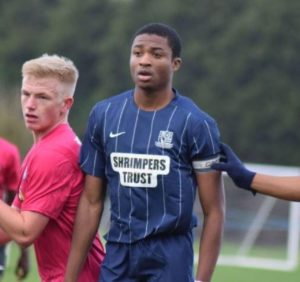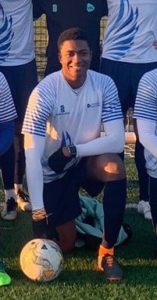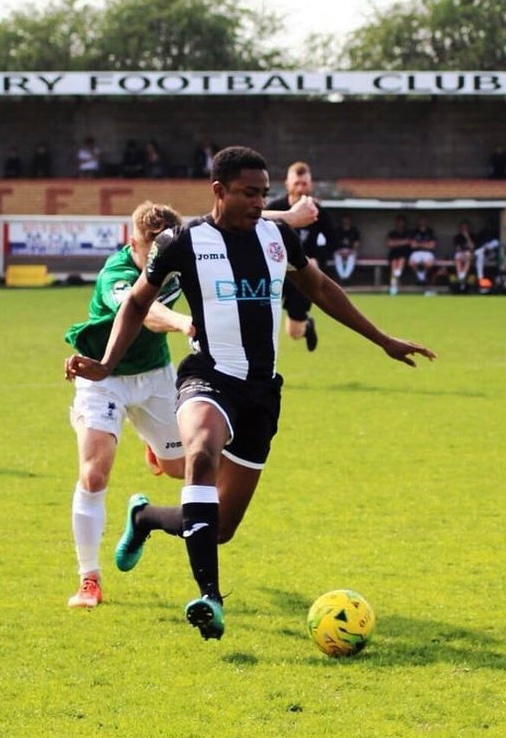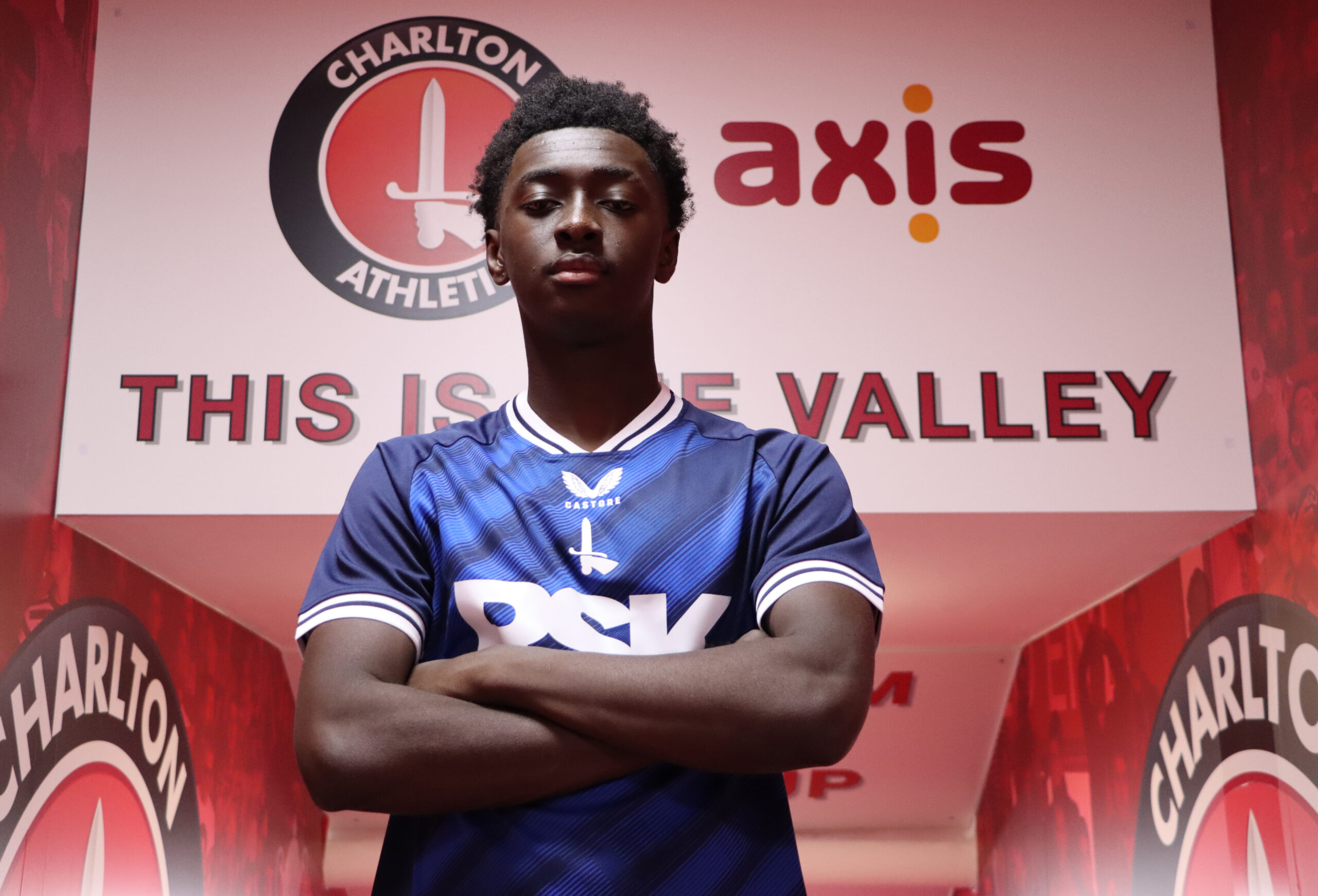Elvijs Norenbergs had a chat with Abdul Salami, a Centre-Half that helped lead the UEL football team to an unbeaten season, about the pains of growing up as an academy player.
Salami was a big part of the UEL’s unbeaten season last year, which was also his last year at the University of East London. He studied law and went onto to complete a master’s degree as well.
Beginning Of Abdul’s football career
Abdul’s story has seen some heartbreak, but his journey into professional football began at the Westwood Wanderers, a Sunday League side that really gave him the taste of winning as they became the first Sunday League side to ever win the Essex County cup, and the London County Cup in the same season.
To really help you understand how good that side was, Abdul explained, “We were training with West Ham at the West Ham facilities because we were that good”.
After seeing what it takes to win as a team, Abdul wanted to push forward because his goal was always to become a professional footballer. At the ages of 14-15, he went on a host trials at the likes of Fulham, West Ham, Chelsea (who are his boyhood club), Barnet and Southend.
Self-admittedly he explained that to make Chelsea’s youth team he “wasn’t good enough.” He did not let that be the reason he stopped however, as he found a home at Southend United and described the relationship with the club as a “Long romantic story”.
The journey with Southend United

Abdul captained the U-18’s at Southend and it is easy to see why after the interview. The 23 year-old has always reached for the top and settled for nothing less as a person first and a sportsman second.
His confidence tells you more about him than anything else, “I pride myself on winning… I will tell my managers at the start of the year, even now I will guarantee you we will win games.”
His leadership ability put his Southend team in positions to be successful as they were able to go to the Last 16 in the FA youth Cup as well as push a league title race down to the wire.
To help someone understand who Abdul is today, you must understand how his story at Southend finished and how that moulded him into who he has become.
Young men in football academies are put in a position where a team sport turns into a “rat race” which would ruin any team’s cohesion and Abdul saw this happen first-hand.
“You are now in a team game, you have got people fighting with each other in order to get their pro contract because at the end of the day you need to make your family eat.”
To explain; when a player joins a youth academy it is considered an apprenticeship which is a two-year deal that gives enough time for the club to evaluate the players.
After those two years the club is left with an option to extend your contract or to cut you. Clubs at the level of Southend will be forced to cut more than half of the players due to financial implications, “The clubs are limited, because they are not the richest clubs in the world”.
At the end of Abdul’s first two seasons at Southend, the club he called home offered him a year extension instead of a full contract that guarantees financial security.
“My academy manager said to me, ‘if you want to make it pro, you have to outwork everyone and that’s how you are going to do it”.
For a guy who captained a big group of players at such a young age it was not an obstacle to find strength in order to keep pushing, which is what he did during his time at Southend, “I was the first one to get in for training, when I say the first one I mean there was no one in the building, the first team lot, the first team manager, my academy manager, my youth team coach, there was no one in the building but me”.
The harsh reality
After the third year, Abdul without an agent or any representative was released from Southend and told by his coaches, “At least you tried… at least you gave it your all”.
A “kick in the teeth” as described by the young man.
After the heart-breaking news from Southend, Abdul was left with almost nothing, at least that is how he felt because further help from the clubs in assisting you with finding education or work outside of football after a player’s release is next to none, “I was like so what am I going to do now?”.
Abdul always has valued education, so, thankfully he had a rough idea of his next step. He went on some visits with a couple of universities to see what they can offer him for his future.
Importance of university and education
In a meeting with some UEL representatives, one of them being Ryan Gordon, Abdul found out that they can offer him a scholarship at the University and he could study law. “I always wanted to go to university no matter what, so whether I played professionally or not I’m going to Uni, I’m getting a degree because I value education.”

What really made Abdul’s time at UEL special was the “care and love” he received from the staff at UEL with additional support from their Sports and Conditioning department and the sports psychologist which helped get his mind right after the release, “UEL have a special place in my heart because they looked after me with my mental side”.
A man integral to his comeback in football and his development was the first team coach, Ryan Gordon. As Abdul explained in the interview, “How I describe Ryan is, I won’t like to call him a coach which sounds weird, Ryan’s more of a mentor as in he taught me… I like him because he taught me a lot about life in those three years (at UEL).”
If his relationship between Southend was a sort of romantic story, then his story at UEL should be described as one of the best comeback stories in university history. Abdul was a crucial part of the UEL unbeaten team last year and once again was a part of a squad that did something that had never been done before. Three years after being released and struggling to find a purpose.
Coincidentally, or not, one of his favourite and best stories from his time at UEL is the story of how they found out that they had gone the whole season unbeaten, “we found out that we won the league unbeaten on the bus, but we didn’t really know so we didn’t celebrate… everyone was whispering ‘I think we done it’… next training session we didn’t even train we just started singing”.
Abdul’s story at UEL finished on a high but the trophy is not the only thing he left behind when graduating.
Life after his degree
Abdul worked together with Elizabeth Egan to create something called “So much more than an athlete” which is a programme/concept for UEL athletes. This is a programme close to Abdul’s heart because his message for young athletes these days is to realise that there is a world outside of football or any other sport.
Abdul still plays semi-professionally and explained that he mainly only does it so that he can take young men, just dropped from academies, under his wing and help them understand that it does not mean the end of the world, “I’m playing football, but my purpose is to play as high as possible and tell other people “go.” … I don’t have any shyness or anything to call Ryan (Gordon) or calling any of the UEL staff and saying “yeah I’ve got a player, can he come for a trial, he wants to go to Uni”.
The unfortunate end of his Southend career never made him give up. He is now studying his master’s in law to become an entertainment lawyer and to one day start-up his own firm, which would offer young sportsmen and women, as well as musicians and other entertainers the right help and support in legal negotiations, as well as other aspects of their professional life which is something he never had. “I just want people to stop signing things when they come from an uneducated background, you can just come to me and I can tell you what a contract should look like, I can tell you the pros and cons.”
A special shout out to Elizabeth Egan and the “So much more than an athlete” programme.
We hope the programme keeps growing and more athletes realise that there is that extra support or a little escape route from their sports even for just an hour a week.




